
| Preface | Perth | Stuart Highway | Uluru | Port Douglas | Sydney | Sturt Highway | Kangaroo Island | Indian Pacific | Perth |
Great Southern Railway—Indian Pacific
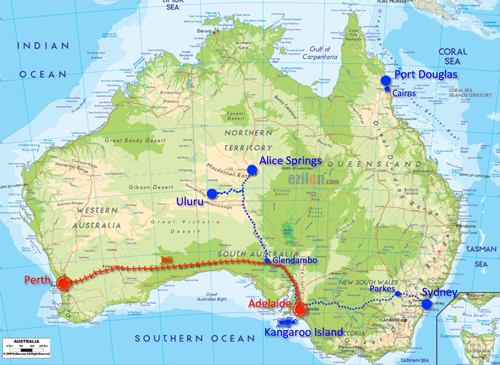
An event-free morning spent retracing our steps back to the KI airport, hop to Adelaide, and reunite with the rest of our bags. Since it was a little complicated, and not a crazy distance, we treated ourselves to a cab to the railway station to drop the bags straight off again. The cabbie accepted our proposal to use him again to get into town if he was to wait five or ten minutes while we performed the bag drop.
We were invited to a dinner at the National Wine Centre of Australia before boarding the train. Since it sat in the grounds of the Adelaide Botanical Garden, that seemed as reasonable a spot as any to spent the afternoon wandering. Or rather I wandered while Claudia found a sunny patch of grass and snoozed. Her's was a popular choice I noticed as I wandered. It was a well-loved spot. One of the pavilions was dedicated to a someone for life-long service, and dated 1915. All the exhibits had a sort of Victorian scale, even the recently opened rainforest display, with its lovely figure-of-eight path, one loop half way up the canopy, the other back down at ground level, but the whole path no more than 150 meters end-to-end.
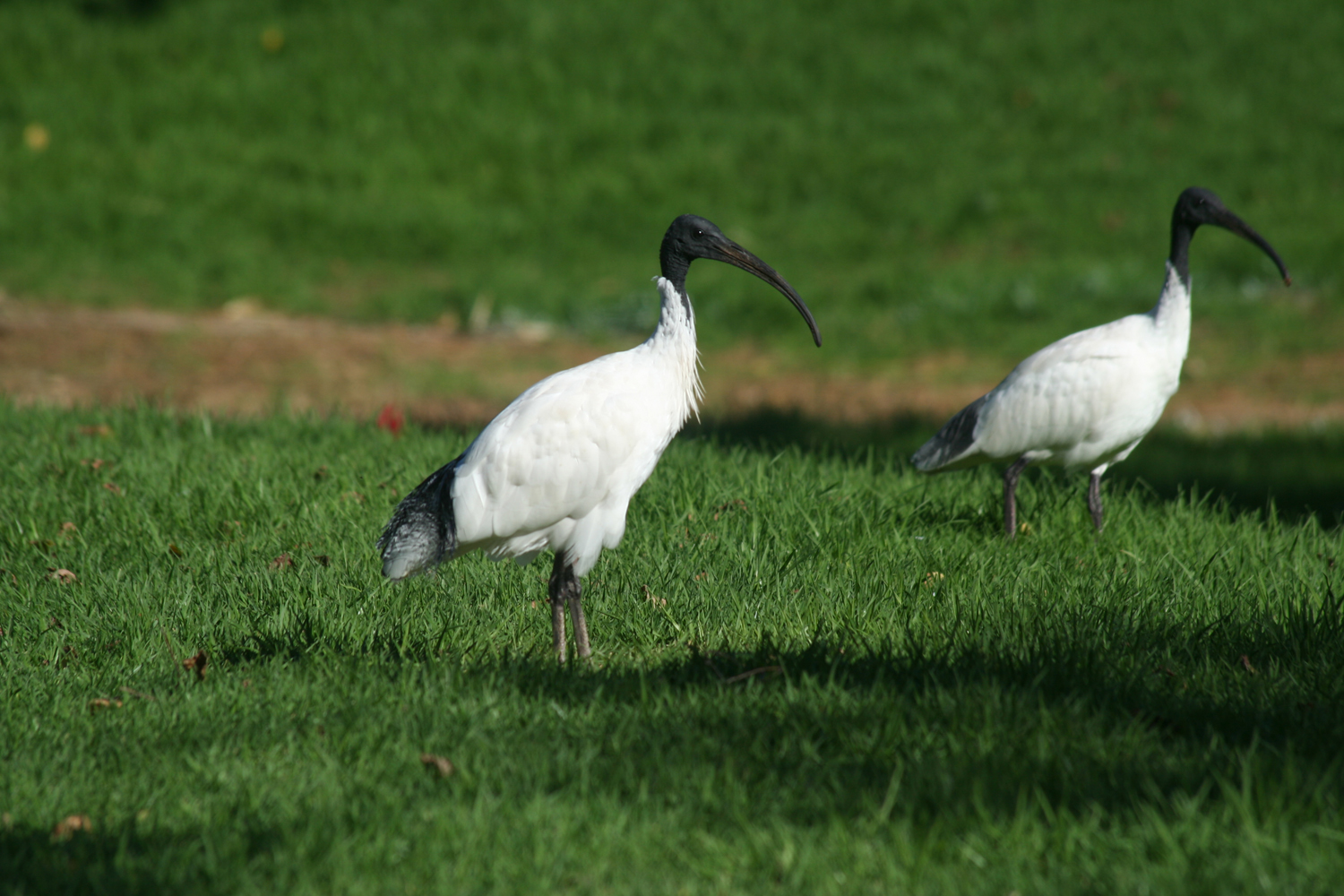

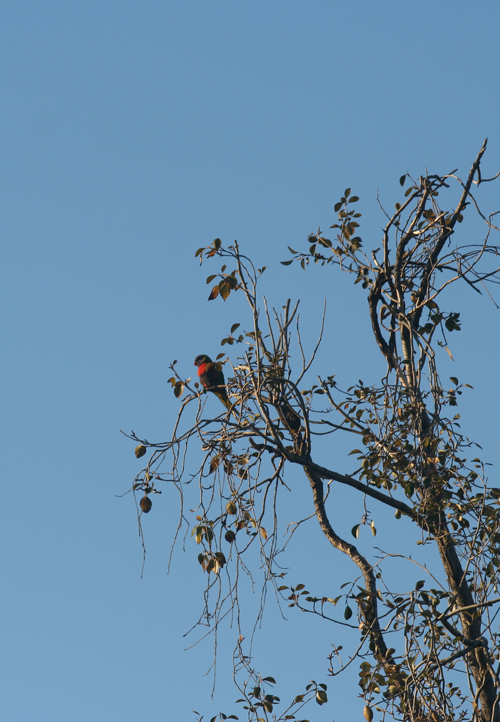 |
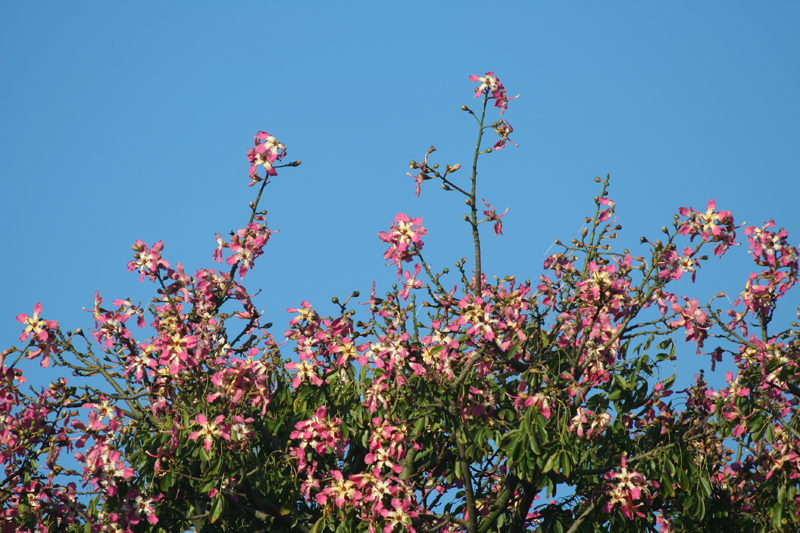 Not really being a plant guy, I photographed more of the birds than the vegetation, at least until the sun went down and the light started to perform its usual setting wonders. The lightest hour of day is the hour before dusk?
Not really being a plant guy, I photographed more of the birds than the vegetation, at least until the sun went down and the light started to perform its usual setting wonders. The lightest hour of day is the hour before dusk? |
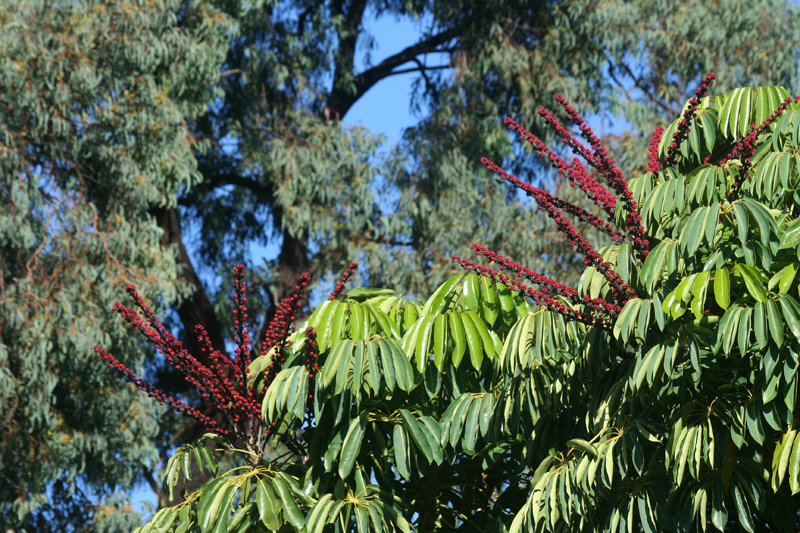 |
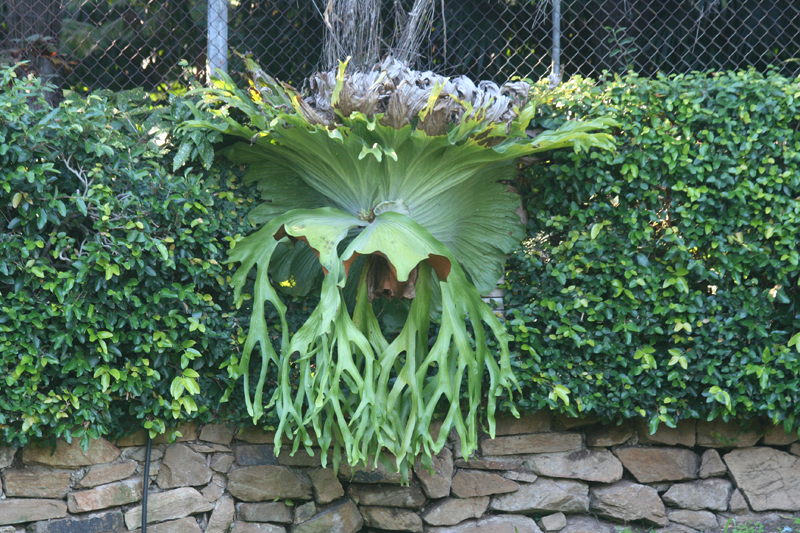 |
Dinner
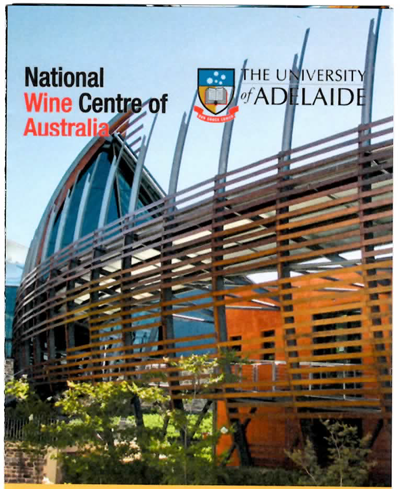
Time for dinner and the National Wine Centre of Australia. Everyone was handed one of those credit cards they use in liquor stores to dispense wine samples. Those of us slumming in Gold service had half the value that the Platinum folks had (those being the only two classes of service on the train), but we had enough credit to try four samples from the several hundred on offer while we sat in the bar area. Canopies were brought around, and the bar gradually filled up with fellow passengers. Although we had checked in hours earlier at the train terminal (so we could abandon our bags), most other folks were checking in here. Canopes and wine made checkin considerably more civilized than the usual airport cattle-processing debacle. A conspicuous guest in bright red trousers, luminous green trainers, and a huge white watch came by dragging two identical duffles to the check-in desk. Five minutes later he made the same trip, this time more easily rolling two identical hard-sided suitcases. On his final lap, he was accompanied by his wife, each pulling identical cabin luggage. Ying to his yang, she was wearing a jacket of an identical shade of red as her husband's trow. Someone couldn't help remarking on it. "We celebrate color!" was his delighted response.
At the appointed hour we were lead to the main dining room, where there were five round tables set up for about a dozen folks each. Time to mingle with our fellow travellers. Despite the luxury status of the train, if it had not been obvious in the bar, it was now very obvious that we were not in the Kansas we'd been experiencing in our travels so far. Odd really. Even in the outback townships, the locals at the bar seemed well-travelled, and extremely well-informed about, say, international politics. Here, of the three Australian couples we were sat with, only one had travelled internationally, and one person was openly hostile to the idea. "Why would I want to go over, around or through places where I would be shot at?" Clearly implicating muslims, but cutting himself off from the whole of Europe at the same time, to name one destination purely at random. It was by far the most bigoted remark we heard the whole trip.
Perhaps he was provoked by the vocal half of the British women making up the rest of our group, who in a very short amount of time seemed to manage to ruffle the feathers of most, if not all, of her audience. Why describe the local chocolate as "disgusting" instead of merely "different", or "not what I expected"? (Mind you, Britain's favorite chocololate, Cadbury's, was also "disgusting" and I have to admit it's not the greatest chocolate in the world.) I noticed the same thing with a much more thoughtful Brit we had breakfast with the following morning, who described Vegemite as "awful" even though she loved Marmite, the UK equivalent. I had actually brought the subject up when asked to pass the Vegemite, because I had tried it myself earlier in the trip (growing up on Marmite myself, to this day I still have it in the cupboard as a comfort food for when I'm sick) I had always assumed they were the same thing, but indeed there was a slight but distinct difference in their flavors. Vegemite is a little sweeter, (maltier) and I definitely prefer the more savory version, but to call it "awful" especially while still amongst the natives seemed unnecessarily harsh.
After the slight overserving incident back at Uluru, I was warned to be on my best behavior with the free wine that flowed (in my case a very reasonable Shiraz) but we really shouldn't have worried. The locals were swilling it back at two or three times the rate. The meal was simple but nicely done. I had an excellent steak and Claudia had snook (a local fish) with roast potato and salad, with a Piña Colada panna cotta dessert (C's favorite, she even stole most of mine). Coffee (no thank you) and chocolate finished us off, and I noticed our chocosnobs from the UK made a point of sniffing it and pushing it aside.
Out in the parking lot: a first. The bus could not find a way out of the newly reconfigured space. Twice the driver made six- or -eight-point turns trying to find a way back onto the street without knocking over any bollards, or mounting any curbs. After more than ten minutes, we were finally back exactly where we started. Then, to a small round of applause, he gave up, drove right over the remaining obstacles and headed out into the traffic. It was a relief to know that this was a train-organized trip, and so there was no danger of the train leaving without us. The driver continued his commentary as we crossed the small town, a rather attractive mixture of historial stone buildings with their classic Aussie (or Bourbon Street) verandas and balconies, and chic new glass and concrete structures.
The train
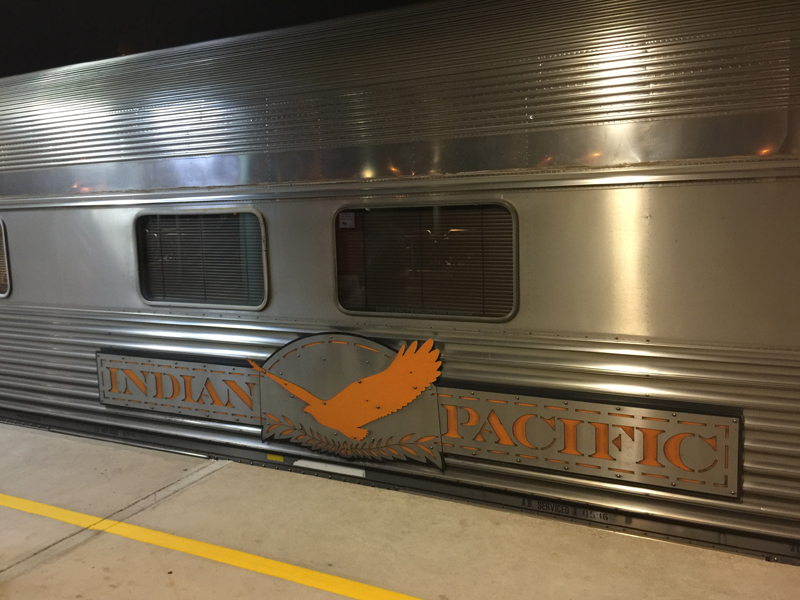
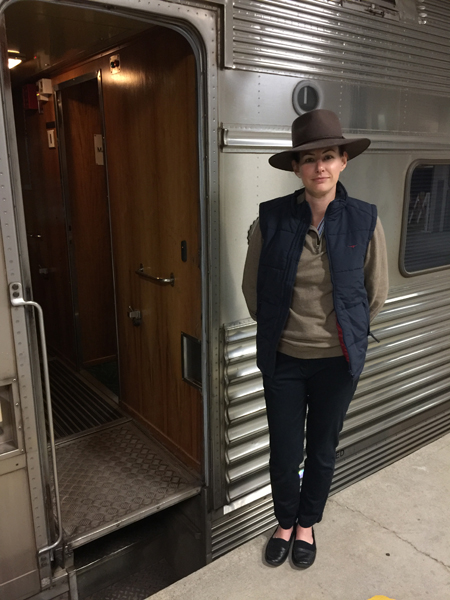
As a result, the train was ready for us as we pulled up, with staff standing, Shinkansen-like, at each door. There was still plenty of time however. Sidney through-passengers were still being entertained by a singer/guitar player in the main terminus, but of course we were too anxious to be aboard to dally with them, or the compulsory gift shop, so headed straight for our car, mercifully close to the middle of the train, and therefore to the main terminus door. The train had two locomotives, two baggage cars, and then 30 passenger cars—making for a potentially long walk even if you start from the middle.
A ship-like PA announcement warned of ten minutes to departure and non-passengers needing to disembark, and I psyched myself up to make a quick jog to the front of the train to grab a snapshot, but I'd no sooner picked up the camera when the call was followed by a similar but this time flight-like crew call to secure the doors for departure. And then we started to roll.
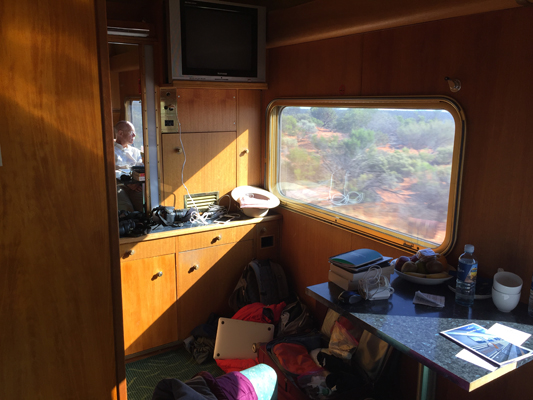
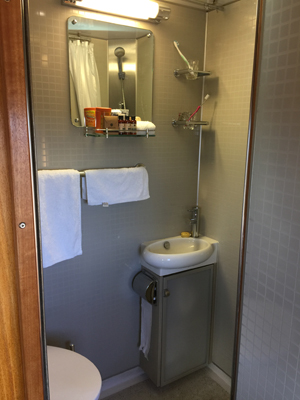
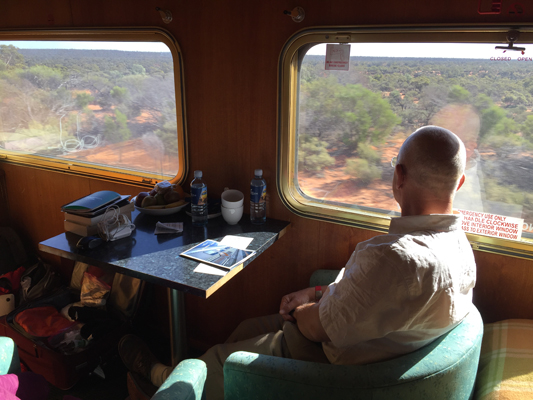
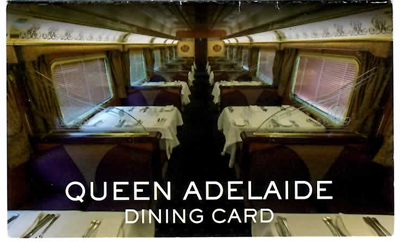

In our usual style, I left Claudia to prep for bed while I headed out in search of a nightcap. Memories of childhood train journeys: trains with corridors, privacy, doors at the end of each carriage letting you out into the clear no-mans-land of the concertina-folded connecting tunnel between the cars, complete with the smoky smell of heavy machinery and its lubricants, then back through the airlock into the next car. After three or four of these, I came to the lounge car. Unfamiliar territory (while childhood trains had restaurant cars and standup bars, I don't remember there being such a thing as a lounge, with easy chairs and sofas) but this one would have fit right in. I asked if such a thing as a gin and tonic was possible, and the barista looked at me as if I had two heads. Since all drinks were complimentary which in my book tends to mean "limited in range and quality" I didn't think it was so dumb a question. To my point he did only have Tanqueray, but as they say around here, I didn't hold that against him. What was more curious was that he had to carefully measure out the unit, and it wasn't a very big unit. "You can put another one of those in there if you like." "Actually, I'm sorry sir, but I cannot." "Seriously? But if I just chugged that straight down, and handed the glass right back to you, you'd be happy to repeat the cycle?" "Very happy sir." Sheesh. I nursed my half-a-drink instead, and then after a decent interval returned for the other half. True to his word, when I finally returned my glass, he offered yet another refill, but it was time for bed.
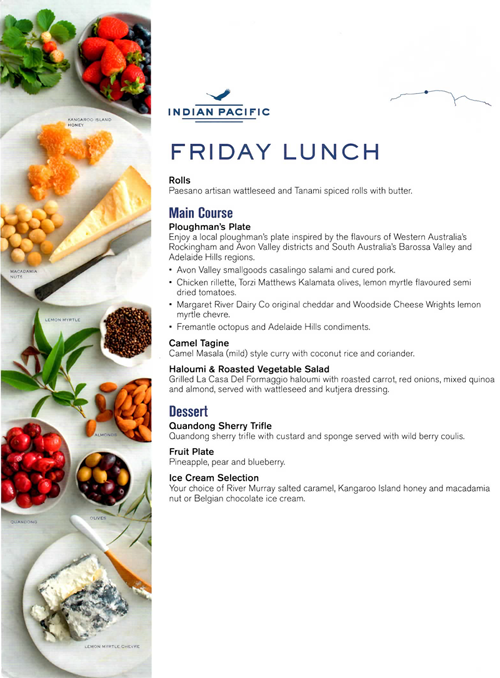
In 1912, two construction crews, starting in Kalgoorlie (595km 370miles east of Perth) and Port Augusta (332km 200miles north of Adelaide), started construction on the 1996km (1250miles) gap in the railway line that would connect Perth with Sidney. Five years later, on 17 October 1917, the teams finally met after building the longest stretch of straight track in the world. It still is. A week later, at 10:15am on the morning of 25 October 1917, the first eastbound train, the Transcontinental Express, departed Kalgoorie for Port Augusta. While the line was now complete, different sections were different gauge and travellers taking the full Sydney to Perth journey were required to change trains at least five times to complete their journey, a problem that was not totally rectified until 1970. On 23 February 1970 the newly-named Indian Pacific made its inaugural uninterrupted run in 62 hours and 20 minutes. 10,000 people turned out in Perth to meet it. Henry Roach, owner and founder of the Independent Oil Company, won a national competition to name the train, basing his idea, surprise, on the fact that the line joined the Indian Ocean in the west with the Pacific Ocean in the East. Showing a tad more imagination, the wedge-tailed eagle was adopted as an emblem. As the largest bird of prey in Australia, the wedge-tail's 2.3m wingspan symbolises the spanning of the country. Our journey, Adelaide to Perth, was 2913km (1820miles) or the distance from Boston to Dallas.
The train's average speed is 85/km/h with a maximum speed of 115km/h. Average length 675m (ours was longer than that, as it had 30+ coaches, not the 28 required to make up that number.
Full breakfast: Middle bacon, country style sausage, house baked beans, spinach, eggs any style. Casalingo Frittata: Flat egg omelette, with Avon Valley salami, native saltbush, onion, sun-dried tomato, bocconcini and herbs with smoked paprika sour cream.
To my very pleasant surprise, the printed Beer menu included McLaren Vale Ale, James Squire "Four Wives", and Coopers Pale Ale. Not that I wanted to see these in particular—far from it, I'd never heard of them. The surprise was the very fact that the menu included beers that I had not heard of, and therefore had a good chance of being micro-brewed, which of course in turn meant that they would at least be interesting, if not necessarily to my liking. It was a huge pleasure therefore to just start picking them off the list as the meals rolled by.
We were not expecting to sleep in when the bed was in perpetual motion, but with a 90 minute time change it meant that that by 6am we were both in the lounge car watching the world roll by from both sides. The barista was prepping for the morning rush of coffees when a waitress rolled by cradling two big carafs. "How do you like my jugs?" she flirted but he ignored her. "It was an oldie" she sighed as she continued by.
Music from the next cabin leaked through the walls. A country and western dime-a-dozen whiner was followed by The Seekers Morningtown Ride, then Peter, Paul, and Mary's Puff the Magic Dragon, all the sorts of music that take only moments before I become homicidal or suicidal, anything to make it stop.
One of the things I was looking forward to on the ride was the sheer nothingness. A time to just read, sleep, write up notes, let the world roll by. But there's something about the moving that numbs the brain and leaves me somehow happy to just sit there, in mental neutral. It's not the view, because the same thing happens on planes, and it is not just me, because Wendy our hostess in Julaten had made the same observation describing her recent trip to Europe. I wonder if it is related to a motion-sickness defense system, because (just one of) the unpleasant side-effects of a bad dose of sickness is that I'm almost catatonic, and indeed getting back to full alertness is one of the longest parts of the recovery, several days in some cases.
But it is hypnotic. It seemed right to be just rolling along at 40 or 50 miles an hour, with the scenary slowly changing from completely flat empty plains, to wooded sections, then rolling hills (nothing more than fifty feet or so, but enough to block the view temporarily), then some combination of both. Like elsewhere, it had clearly been raining, and some of the lake beds had water in them, and to our surprise one of them even had ducks swimming on it. Where do they go for the rest of the year/decade once the water is all gone again?
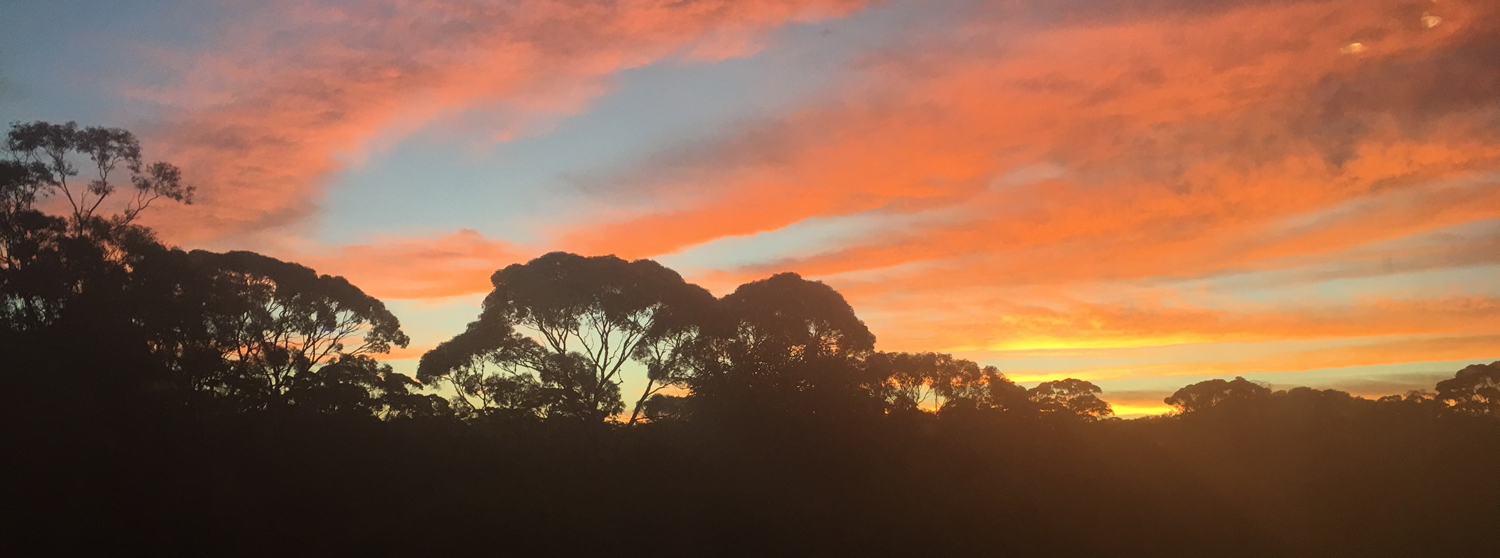

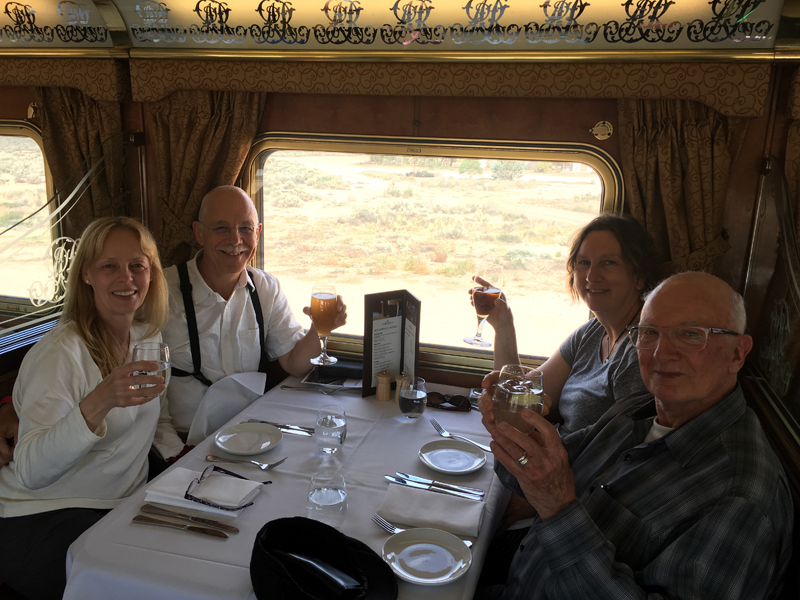 Lunch with two of our favorite dining companions, Gretel from Norfolk and Dennis the retired priest (both travelling alone). Lunch with two of our favorite dining companions, Gretel from Norfolk and Dennis the retired priest (both travelling alone). |
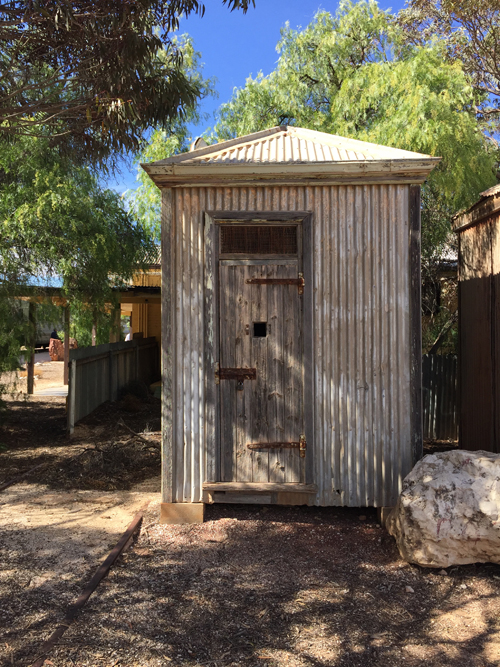 |
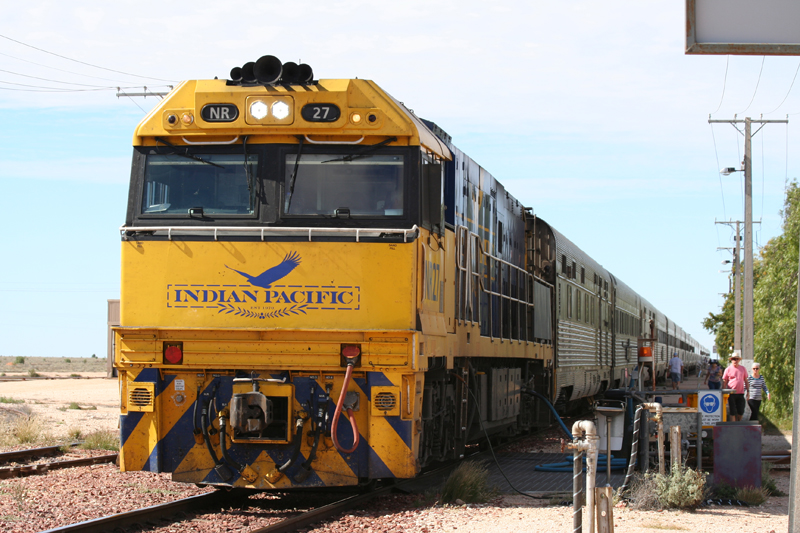 |
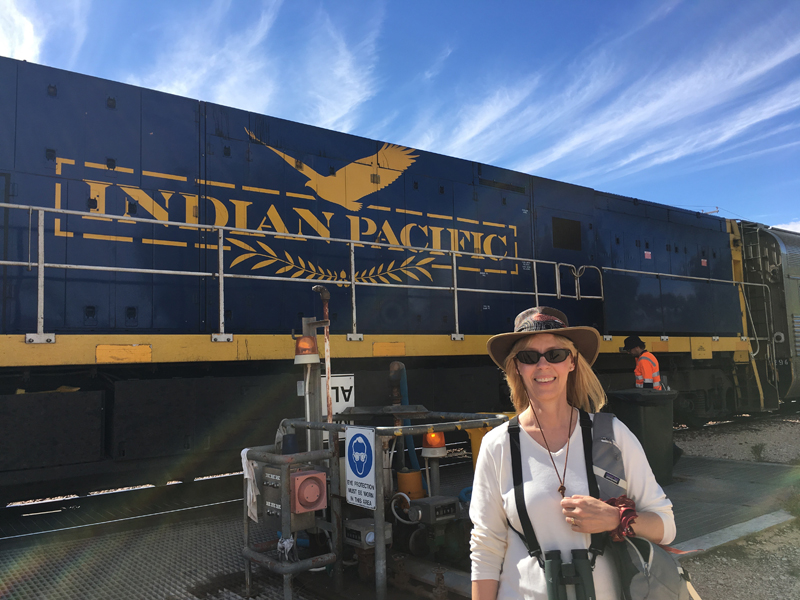 |
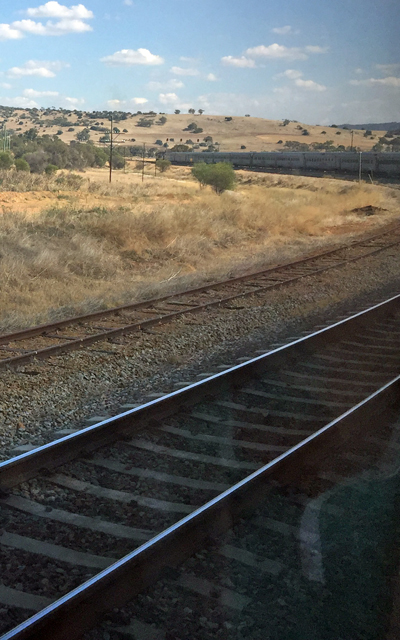 |
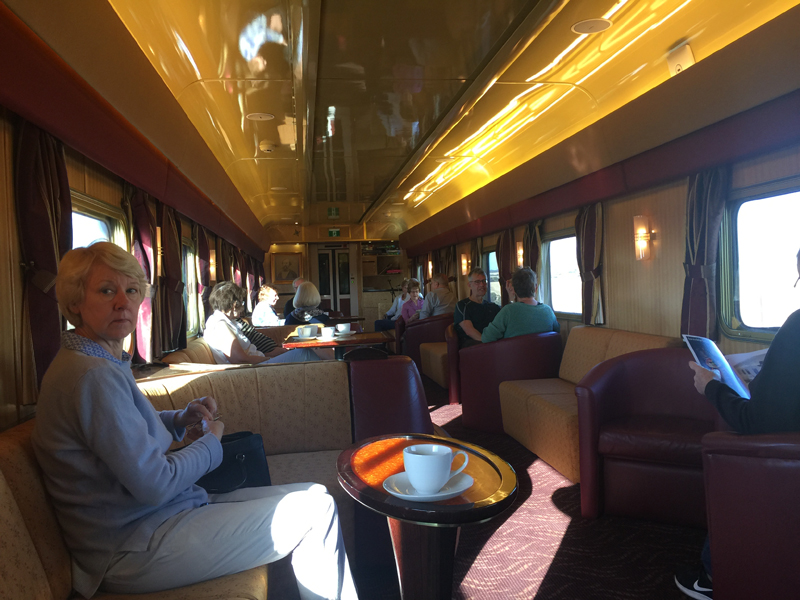 |
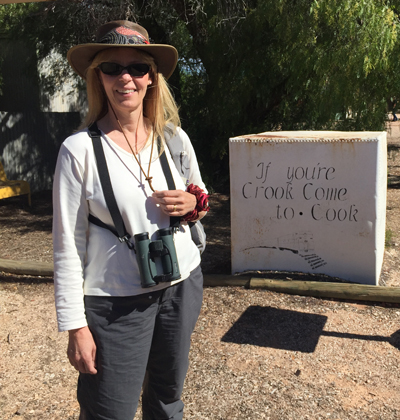 
|
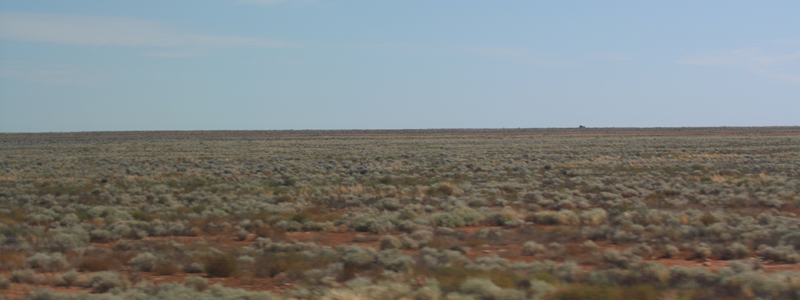
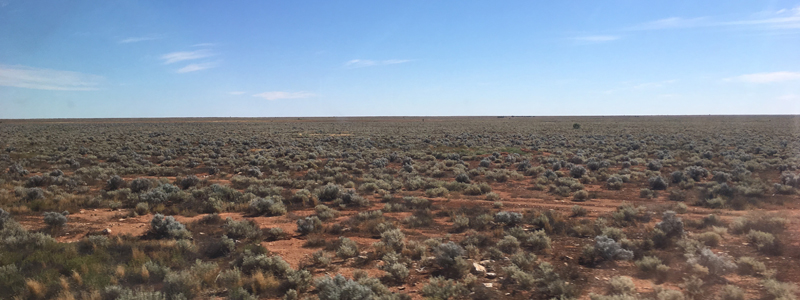
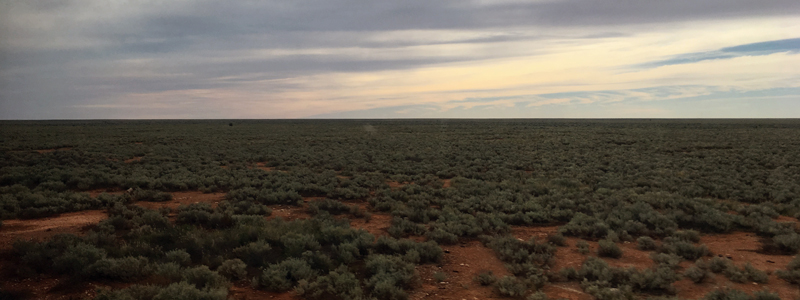
Around 10am the cycle returned to nothingness and stayed there. The Nullarbor Plain. Null:No. Arbor: Tree. Plain: Flat as a pancake.
There's clearly life out here, because raptors were posted at very regular intervals, but we never saw what they saw. The only other sign of life we were able to detect were the occassional flock of galahs.
To keep us awake, the entertainment system randomly turned itself on, cycled through all the channels, and then turned itself off again. Generally this was followed by a visit from the on-board electrician, who was amusing himself by tracking this fault up and down the train. "Did you hear that?" Yup. "You are lucky. Cabin 4 can't turn it off at all. Earlier there were other people who couldn't turn it on." CMT: "System upgrade?" Engineer: "Interestingly, no, but the PA system was just upgraded and it is on the same wire." RT: "There's no such thing as a coincidence." Engineer: "Exactly."
"Rock sheep" joined "leaf parrot" and "bag bird" in our growing vocabularly of false fauna sightings, but our continual staring out of the windows was rewarded every couple of hours with confirmed sightings of the real thing. Circling wedge tailed eagles, the symbol of the Indian Pacific, at least a dozen kangaroos (all sighted within a minute of each other), a pair of emus, and most startling of all, a small herd of (possibly) ferral camels, right beside the tracks. More regularly we stopped to let goods trains go by. By counting the seconds, I discovered that these trains all took a minute or more to pass. At the conservative estimate of 60kph, that would make them a kilometer or more long, which was as good a reason as any to give them priority.
At Cook we had stopped for gas and water and another first: a train-ride long enough that the engine ran out of gas. "Welcome to Cook, the Queen City of the Nullabor, postcode 5710, population four. You are standing alongside the longest stretch of straight rail in the world, spanning 478 km." According to Australian astronaut Andy Thomas, the rail line can even be spotted from space, looking like "a very fine pencil line across the desert". We were standing on the western extreme of South Australia on the edge of the Nullabor Plain, a barren desert plateau twice the size of England. The nearest major town, Ceduna, was a five hour drive away and the closest major sealed road, the Eyre Highway, was an hour's drive away. To make the point, a sign asked "How remote are you?" and listed the following distances:
Adelaide - 1138km
Port Augusta - 826km
Kalgoorlie - 854km
Perth - 1523km
Sydney - 1984km
Darwin - 2017km
I thought the lack of any examples beyond Australia's already remote shores rather made the point even more emphatically for international observers.
Refuelling was a 30 minute process, giving us an opportunity to walk to the front of the train for a few snapshots, and other passengers wandered around the half dozen buildings that comprised the ghost town. It was once a thriving community of 50 people with a school, swimming pool, hospital and gaol, which I mistook for a dunny until I examined it more closely.

As we coasted to a stop in Rawlinna around 6pm we were still crossing the Nullarbor. It was dark, but as the whole train disembarked lanterns lit the way to the little station, completely dwarfed by the length of the train. Between the station buildings and the train, two lines of tables had been set up, again with lanterns providing a little light for each table. All two hundred of us were served simultaneously by putting down three big roasting pans between each group of eight. One held eight baked potatoes still in their aluminium jackets, the next melt-in-the-mouth hunks of lamb, lamb sausages, and a big boat of gravy. The final pan was piled high with roast parsnips, carrots, and red beets.
The BBQ was a little reminder of how Americanized I have become. There was no question that everything had been prepared on an open flame. Perhaps not the gravy, but definitely everything else, including the potatoes still in their tinfoil jackets. But it was absolutely not what I was expecting, and all the more excellent for that. Better still, the roasted roots were much more up Claudia's street than regular bbq fare, and so contrary to expectation she did not starve. It was washed down with as much wine (Shiraz in my case) as you cared to take on. There was plenty of everything, and all 240 of us were served simultaneously. Amazing. The little coconutty thing that showed up for dessert was something of a token effort, but who cared? We'd all stuffed ourselves on the main course. It was absolutely delicious. I took a picture of my plateful, because that's what I do, and to help me remember what was on it, but for the first time ever, instead of being amazed at how photogenic the results turned out, for once the results were shocking. It looked like the proverbial dogs breakfast.
I was a little surprised that they didn't turn all the lights off to give us an opportunity to enjoy the (light) pollution-free night sky, but on reflection it was probably impractical to turn off all the individual lanterns.
There was a slight commotion as we were all counted back on to the train, when the census counter discovered that he'd accidently allocated a previous couple into the cabin that this next couple now claimed to occupy: so who were the previous folks, and to where did they belong? As I waited in the lounge bar for my Rusty Nail nightcap, he rushed up and down the train looking for the "missing" couple, but he quickly either found them or realized that as long as the body count was correct it was less important that they were allocated to the correct cabin. The train pulled away as I made my way back to our cabin.
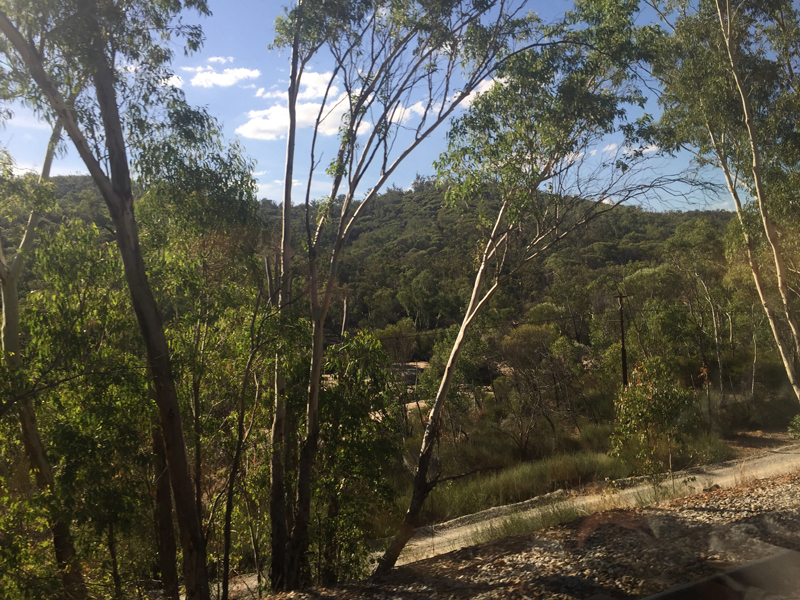

By morning, the plains had started to give way to a more hospitable landscape. First trees, then stubble fields and sheep flocks, then townships and finally cars and sealed roads. Sheep and cattle started appearing gathered under the shade of lone gum trees. In Tammin, the tarmac revealed itself to be the Great Western Highway: the main (only) road from Adelaide to Perth, which had turned north at Kalgoorlie from it's previously more southerly route, and then at Southern Cross ran right beside the train all the way into Perth, still seven hours away.
But first several more meals. We were always seated a whole table at a time, so we were always joined by a random pair of other diners. Although there were 240 passengers on the train, they were divided up into perhaps four distinct groups, each with roughly four sleeping cars, a lounge and a dining car. Therefore there were only around 60 folks in any particular group, which gave one a sporting chance of recognizing them. As we got to know these other characters it felt like we were building up the suspect list for Agatha Christie's "Murder on the Indian Pacific Not-Bloody-Likely-Express". The victim of course would be the British biaché from the first night's dinner. I was probably the prime suspect, quite happy to put her out of everyone else's misery. We should not rule out the nutty Germans from the check-in dinner, though they must have belonged to a different section of train, because we did not see them again until we arrived in Perth. But then there was the very innocent-sounding (also British) couple who had spent the last 30 years living in Geneva working for non-profits and saving the world they were now spending six months circumnavigating. Or Gretel from Norfolk (hmm, is there a pattern here?) a would-be academic with a love of ancient (Greco-Roman) history, whom Claudia engaged in an interesting debate about Heinrich Schliemann, and his connection to ancient Troy and to Claudia's grandfather. Twice we sat with Dennis the retired priest. Like all priests in my experience, he was not so much retired as absolved of a fixed ministry, filling in his days subbing for others, and providing support services at the local old age pensioners home in Hobart. He may have been 87 years old, but he was sharp as a tack, and endeared himself to me immediately by ordering a gin and tonic with his lunch. Rod and Rob the Australians whom I took to be a gay couple on our first meeting, proved to be worthy candidates for the list of suspects by changing roles. Decidely not-gay, Rob "told everyone [Rod] was a genius until I finally convinced myself I really was" and Rod was "fond of married women, especially if they have no intention of leaving their husbands". Rob introduced us to his wife sometime the following day, and we had a great conversation with him about British cars and Australian history.
In the final approach to Perth the terrain suddenly turned lumpy. Nothing tall, but steep-sided little hillocks, with an actual mountain-like river running and splashing over its rocky bottom. All too soon this gave way to buildings, traffic, and a final brief stop to pick up a pilot to guide us through the last half-dozen miles, for which our regular driver was apparently uncertified. Majestically, and probably something to do with inertia of a thirty-car train, and the slop in the couplings, as always we didn't seem to apply any brakes, just coasting ever more slowly until, inching past the platform we finally rolled to a stop.
Exhausted after doing nothing for 48 hours except eat, sit on our asses and eat again, we staggered into our hotel room and for the first time in three weeks, turned on a screen and watched a movie. I didn't even go down to fetch myself a beer from the bar, instead grabbing my very first mini-bar purchase. Since it was a beer I needed to try anyway, it seemed a reasonable compromise.